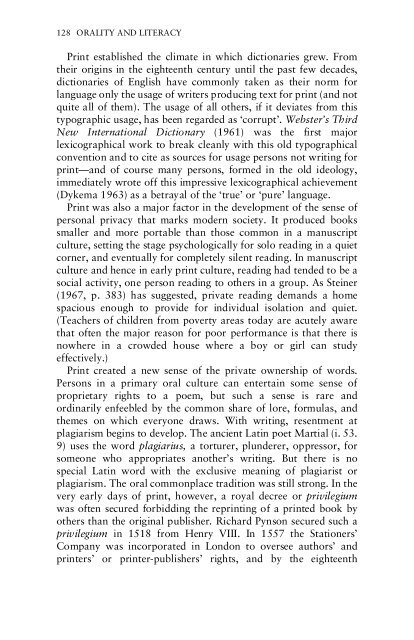Orality and Literacy: The Technologizing of the Word - Monoskop
Orality and Literacy: The Technologizing of the Word - Monoskop
Orality and Literacy: The Technologizing of the Word - Monoskop
You also want an ePaper? Increase the reach of your titles
YUMPU automatically turns print PDFs into web optimized ePapers that Google loves.
128 ORALITY AND LITERACY<br />
Print established <strong>the</strong> climate in which dictionaries grew. From<br />
<strong>the</strong>ir origins in <strong>the</strong> eighteenth century until <strong>the</strong> past few decades,<br />
dictionaries <strong>of</strong> English have commonly taken as <strong>the</strong>ir norm for<br />
language only <strong>the</strong> usage <strong>of</strong> writers producing text for print (<strong>and</strong> not<br />
quite all <strong>of</strong> <strong>the</strong>m). <strong>The</strong> usage <strong>of</strong> all o<strong>the</strong>rs, if it deviates from this<br />
typographic usage, has been regarded as ‘corrupt’. Webster’s Third<br />
New International Dictionary (1961) was <strong>the</strong> first major<br />
lexicographical work to break cleanly with this old typographical<br />
convention <strong>and</strong> to cite as sources for usage persons not writing for<br />
print—<strong>and</strong> <strong>of</strong> course many persons, formed in <strong>the</strong> old ideology,<br />
immediately wrote <strong>of</strong>f this impressive lexicographical achievement<br />
(Dykema 1963) as a betrayal <strong>of</strong> <strong>the</strong> ‘true’ or ‘pure’ language.<br />
Print was also a major factor in <strong>the</strong> development <strong>of</strong> <strong>the</strong> sense <strong>of</strong><br />
personal privacy that marks modern society. It produced books<br />
smaller <strong>and</strong> more portable than those common in a manuscript<br />
culture, setting <strong>the</strong> stage psychologically for solo reading in a quiet<br />
corner, <strong>and</strong> eventually for completely silent reading. In manuscript<br />
culture <strong>and</strong> hence in early print culture, reading had tended to be a<br />
social activity, one person reading to o<strong>the</strong>rs in a group. As Steiner<br />
(1967, p. 383) has suggested, private reading dem<strong>and</strong>s a home<br />
spacious enough to provide for individual isolation <strong>and</strong> quiet.<br />
(Teachers <strong>of</strong> children from poverty areas today are acutely aware<br />
that <strong>of</strong>ten <strong>the</strong> major reason for poor performance is that <strong>the</strong>re is<br />
nowhere in a crowded house where a boy or girl can study<br />
effectively.)<br />
Print created a new sense <strong>of</strong> <strong>the</strong> private ownership <strong>of</strong> words.<br />
Persons in a primary oral culture can entertain some sense <strong>of</strong><br />
proprietary rights to a poem, but such a sense is rare <strong>and</strong><br />
ordinarily enfeebled by <strong>the</strong> common share <strong>of</strong> lore, formulas, <strong>and</strong><br />
<strong>the</strong>mes on which everyone draws. With writing, resentment at<br />
plagiarism begins to develop. <strong>The</strong> ancient Latin poet Martial (i. 53.<br />
9) uses <strong>the</strong> word plagiarius, a torturer, plunderer, oppressor, for<br />
someone who appropriates ano<strong>the</strong>r’s writing. But <strong>the</strong>re is no<br />
special Latin word with <strong>the</strong> exclusive meaning <strong>of</strong> plagiarist or<br />
plagiarism. <strong>The</strong> oral commonplace tradition was still strong. In <strong>the</strong><br />
very early days <strong>of</strong> print, however, a royal decree or privilegium<br />
was <strong>of</strong>ten secured forbidding <strong>the</strong> reprinting <strong>of</strong> a printed book by<br />
o<strong>the</strong>rs than <strong>the</strong> original publisher. Richard Pynson secured such a<br />
privilegium in 1518 from Henry VIII. In 1557 <strong>the</strong> Stationers’<br />
Company was incorporated in London to oversee authors’ <strong>and</strong><br />
printers’ or printer-publishers’ rights, <strong>and</strong> by <strong>the</strong> eighteenth

















